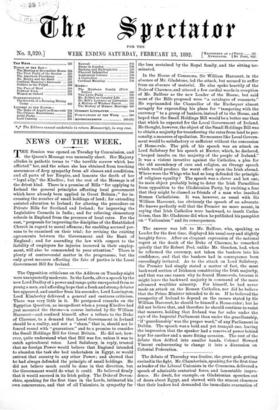In the House of Commons, Sir William Harcourt, in the
absence of Mr. Gladstone, led the attack, but seemed to suffer from an absence of material. He also spoke heartily_ of the Duke of Clarence, and uttered a few cordial words in reception of Mr. Balfour as the new Leader of the House, but said most of the Bills proposed were "a catalogue of remanets." He reprimanded the Chancellor of the Exchequer almost savagely for expounding his plans for "tampering with the currency " to a group of bankers, instead of to the House, and hoped that the Small Holdings Bill would be a better one than that which he expected for the Local Government of Ireland. He thought, however, the object of the Small Holdings Bill was to obtain a majority for transferring the rates from land to per- sonalty, a measure of spoliation. No measure like Local Govern- ment would be satisfactory or sufficient without the concession of Home-rule. The pith of his speech was an attack on Lord Salisbury for his speech at Exeter, which, he declared, " heaped insults on the majority of the people of Ireland." It was a violent invective against the Catholics, a plea for the old ascendency of race and religion, an Orange speech which would produce the worst effect upon the Irish abroad. Where were the Whigs who had so long defended the principle of religious equality ? The speech was a clever and hot one, its main object probably being to deter the Irish Parnellites from opposition to the Gladstonian Party, by exciting a fear that they might be classed as friends of a man who insulted Roman Catholicism. It was, however, as usual with Sir William Harcourt, too obviously the speech of an advocate. He knows perfectly well that the Premier no more meant, in saying that Irish Catholics were backward, to insult Catho- licism, than Mr. Gladstone did when he published his pamphlet on " Vaticanism " and its consequences.


































